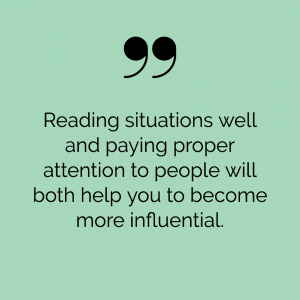Let’s start with the why. Why would you want to improve your influencing skills at work? You’re a manager and people are going to do what you want them to, right?

Sadly, it doesn’t always work like that. While you might have the power to compel people to do as you demand, that doesn’t mean they’re going to do the best possible job for you. Influence is the oil that just makes everything easier in the workplace: people do a better job, more willingly and managers spend less time chasing up.
Also, the days of rigid hierarchies are largely gone which means there are many more people in middle management working across the system and trying to build relationships with colleagues to make things happen.
Look around your workplace, and you’ll see some people who seem to have a magic touch when dealing with others – and some who don’t, despite their more senior position. How do they influence others positively? What are they actually doing?
If you are ambitious in your career, and want to get a reputation as someone who can get things done easily that others find difficult, and can bring together different parts of an organisation, then you need to improve your influencing skills.
Influencing skills can be taught as well as caught, so here are 15 ideas to get you started – and more information on how we at Roffey Park can provide more structured help.
15 Ways To Improve Your Influencing Skills
1.Read a good book

Classics include the 1936 How To Win Friends And Influence People by Dale Carnegie, and The Small BIG (by Steve Martin, Noah Golstein and Robert Cialdini), and the 360 Degree Leader: Develop Your Influence from Anywhere in the Organisation by John C Maxwell. See our list of the 7 best books about influencing skills
2.Be an expert
The more trusted you are, the more likely you are to influence people at work. So make sure you keep up-to-date on issues affecting your industry, and show that you are. Be willing to share, through informal work seminars, blogs, and so on.
3.Be observant

It’s easy to miss the important things about how someone else is feeling or reacting – and that includes you. Get in the habit of asking yourself what the other person in a conversation is thinking. Look for changes in skin colour, breathing, eye movement, fidgeting – any little signs. Noticing the details will help you to understand others and influence them in the right time and way.
4.Keep an eye on the big picture
What exactly are you trying to achieve? How might you do that? If you get close to your goal or achieve it, what happens next? Where does the real power lie in your workplace, and how will you influence it?
5.Trust your intuition

We all have gut feelings about how we think other people will react or behave, but sometimes we’ve been trained to ignore that. Don’t. Pay attention to your intuition, and whether it turns out to be right – and you’re well on the way to improving your influence in the workplace.
6.Be aware of yourself
One of the most crucial tools in becoming more influential at work is to be tuned in to who you are and what you are. What are your strengths and weaknesses? How can you address them?
7.Be aware of your body language
How do you look as you move around the workplace? Do you look confident? Authoritative? And if you are talking to a colleague, is your body language friendly? You want to inspire trust because that way you’ll have influence.
8.And the power of language
Being able to say the right thing – at the right time – is an extraordinary power when it comes to influencing others in the workplace. Hone your vocabulary by wide reading. Maybe even look at good speakers in action through Ted talks and other resources. Ask yourself: why is this so powerful? How are they doing this? How am I reacting?
9.Not coming across well? Change it
If your behaviour isn’t taking you where you want to go, never forget you can change – and that goes for your thoughts and feelings as well. You won’t influence people if you’re behaving the wrong way, or even badly.
10.Think about relationships

What kind of relationships have you got in the workplace? What’s your place in the formal – and more importantly, the informal hierarchy? What are your strongest and weakest relationships like? Who are they with? Who can you influence?
11.Be confident – for the right reasons
Being confident and resilient is important, especially if you’re up against problems or adversity. But that doesn’t mean being arrogant or simply feeling superior. Rather, be confident because you know who and what you are. You’re more likely to influence colleagues by behaving this way.
12.Listen actively

How often do people get your undivided attention? Start by doing that in 1-to-1 situations. Show you’re listening by turning yourself towards them – and no fidgeting with your phone. Listening properly will help you to understand what they are not saying, as well as what they are. Reading situations well and paying proper attention to people will both help you to become more influential.
13.Offer feedback
Once you’ve built a good reputation in the workplace, colleagues will appreciate your feedback on what’s happening, or their thoughts or actions and come to welcome it – so turning you into an influencer.
14.Think about what you want in the context of what others want
Even if you’re objectively right about something, you can’t assume everyone else agrees with you or push through your point of view. Think about their point of view – what’s in it for them? How can you sell the idea as something that is a win-win for you both? Remember – you may need to compromise but that will also make you more influential.
15.Timing is everything

Before you do anything, ask yourself: is this the right time? Will this go down well now or is it a distraction or even completely inappropriate? Is it time to pull back, or go in hard?
Influencing skills can be caught, but they can also be taught
There’s nothing like a face-to-face influencing course with experts who can spot and build on your existing strengths.
Here at Roffey Park, close to London Gatwick, the M25 and fast train links, we’ve got 70 years of experience in supporting leaders and managers, and our Developing Influence and Impact course will help you tackle issues including handling difficult conversations, understanding power dynamics, managing competing operational priorities and improving your influencing skills and practice.
Managers and leaders who’ve completed the four-day course tell us they better understand the range of skills and choices available to them to improve their influencing skills, have increased confidence, ability and presence. They also understand the nature of personal power and politics and can navigate these to be more effective at work, and have a greater awareness of the nature and type of relationships they have – and how it affects their ability to influence employees and colleagues in the workplace.
Businesses who take the time to send employees on this course are investing in their future to make the entire organisation work more creatively and cohesively, and to boost the influencing skills of individuals, no matter what the management structure or their place within it.

![Photo saying [helpful tips] with items of stationary surrounding it](https://www.roffeypark.com/wp-content/uploads/2024/04/15-tips-to-improve-your-influencing-skills-in-the-workplace-2-scaled-1.jpg)



